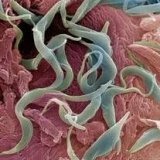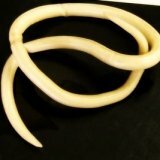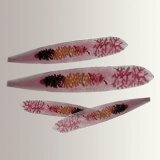Symptoms of enterobiasis and treatment of pinworms

Enterobiasis is a disease associated with the appearance of small roundworms - pinworms, parasitizing the human intestine. Such a disease is common in children, but it can also affect adults. Most often, pinworms get infected from a person who is sick with them, or in public places. The main symptoms of infection with pinworms are: itching in the anus and the outlet of the anus, abdominal pain, loss of appetite, inflammation of the genitals and so on. Treatment of pinworms, enterobiasis should be carried out, mainly, by observing a strict special regime and using antihelminthic drugs.
What are pinworms?
Pinworms are a type of diseases associated with worms, i.e. helminthiosis. Enterobiosis belongs to a group of nematodes, which means a disease caused by roundworms. As the causative agent of enterobiasis is a worm-pin, a very large and round worm. The male of this worm reaches 2-5 millimeters, and the female - 9-12 millimeters. Sexually mature helminths can parasitize in the intestine, but the main area of their distribution is in the lower part of the small intestine and in the large intestine in the initial part of the colon and cecum. The movement of mature females takes place in the rectum area, where they lay eggs in the perianal part on the skin and folds, the worms actively exit from the anus. As a rule, the life expectancy of the helminth female is one to three weeks, and the eggs have invasive properties, which means that they can infect other people four hours after deposition by the female. Enterobiosis is ubiquitous.
How are the pinworms transferred?
A person can be a source of infestation with pinworms in cases when he has to comb his itching places with his hands. Eggs of helminths pass to the hands, after which they spread. Autoinvasion is also possible - this happens when the patient himself swallows the eggs of worms that fell into his hands, thus continuing the development of the disease. Further transfer of enterobiosis can be carried out by using the patient's bed linen or bed linen, toilet bowls, toys, baby pots and other items. Also, there are cases when eggs of helminths pass into the nasopharynx through the dust and are further swallowed. Eggs of pinworms then enter the stomach and sprout into the larvae. Larvae in intestinal conditions have the ability to grow rapidly and turn into sexually mature individuals. Further, adults begin to multiply again. Then the fertilized females get out of the anus, laying eggs, and the larvae are swallowed again, which leads to a new cycle of the disease.
Symptoms and signs of enterobiasis
Symptoms of pinworms, treatment should be taken into account without fail. The main symptoms of enterobiz include night perianal itching, discomfort at the outlet of the anal opening. With minor invasions, itching occurs during the maturation of the next generation of females, when they lay eggs in the folds of the skin and migrate to the rectal area. This itching lasts for one to three days, fades and then appears again after two to three weeks after the last time. In cases where helminthic invasion is massive, itching is painful, it does not stop because new generations of females are required to go out almost every night. When the patient combs the itchy areas, then there is a risk of secondary infection, which contributes to the development of dermatitis, characterized by a persistent current. It is also possible the appearance of paraproctitis and sphincteritis, inflammation of the tissues of the rectum.
For pinworms, cramping pains are also characteristic. Sometimes frequent urge to the toilet, a loose stool, a mushy stool with the appearance of an impurity of mucus. With general intoxication, headaches can occur in people infected with enterobiasis. There may be rapid fatigue and increased irritability, insomnia. There is a risk of illness of enuresis, urinary incontinence in children or develop absent-mindedness and memory loss. In girls, there is a risk of infection with vulvovaginitis, caused by the crawling of helminths into the genital gaps.
If symptoms of enterobiasis are detected, it is worthwhile to start treatment with preparations and follow special diets.
Diagnosis of the disease, detection of enterobiasis and treatment of pinworms.
Symptoms of enterobiasis and treatment of pinworms: unlike other varieties of worms, since they tend to lay eggs in the area around the anus, and not in the intestine, the feces are not checked. A scraping is done from the perianal area.
Since pinworms live only a few weeks, the main method of prevention and treatment of such parasitosis is careful monitoring of compliance with personal hygiene rules for patients. In order to fully withdraw pinworms, it is enough to comply with personal hygiene and proper healthy diet. The main treatment regimen and hygiene should be maintained for three to four weeks. During this treatment, all pinworms in the intestines of the patient must die. Adults, whose children are sick with pinworms, also must comply with the rules of hygiene throughout the family.
However, if the disease is delayed by enterobiasis, it is hard, then in this case it is necessary to use medicines, among them: Combatrin, Mebendazol, Decaris, Piperazine. Medicines should be prescribed depending on the age indications and the calculation of the body weight of the infected. At present, one of the more effective agents against enterobiasis is the drug "Decaris", or "Levamisole."Since pinworms are very contagious, all members of the family must undergo treatment with this anthelminthic drug, this can ensure the prevention of the organism against re-infection with such worms.



